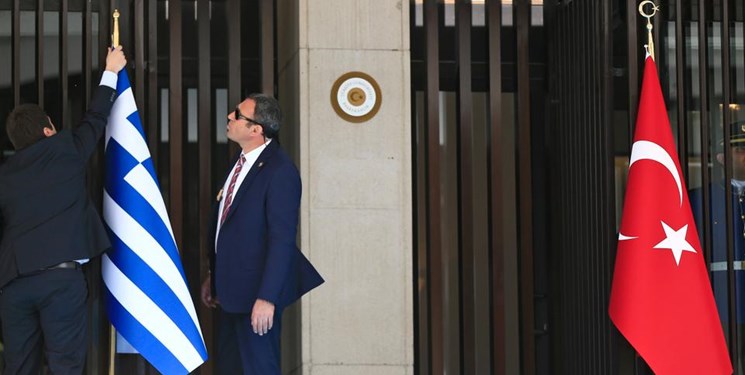Turkish President Erdogan has criticized Greece time and again within the past few weeks and called the country as the pawn of major powers and NATO. The language applied by Erdogan against his neighboring country continues to sharpen. Having said the sentence that “occupation of Turkish islands by Greece does not limit us. When time is ripe, we will do whatever that is needed. We shall surprise you over night”, he has increased his threats unprecedentedly.
Despite the positions taken of both countries in NATO, they have had at odds for decades on a number of issues including a package of different matters such as territorial claims at Aegean Sea and disputes over the airspace of that region. The disputes have brought the two countries on the brink of war three times within the past fifty years. Positions taken by Ankara and Athens, particularly on Aegean Sea have always been a source of dispute and tension. Greece and Turkey consider each other as the most essential security threat and have defined the control of East Mediterranean and Aegean Sea as the basis of their competition. The two countries have disputes over the proprietorship of a number of islands located between maritime boundaries at Mediterranean and Aegean seas. Likewise, the main reason of spiraling tensions between Ankara and Athens in Eastern Mediterranean is Turkish measure in exploration and extraction of oil and gas from Mediterranean Sea and neighboring regions to Greek islands.
Following the March meeting held in Istanbul between Erdogan and Greek Prime Minister Mitsotakis, approaching trend between the two countries faded, and Erdogan rejects any meeting or dialog with the Prime Minister of the Hellenic Republic. He believes that those who seize every opportunity to make disturbance through rudeness at Aegean Sea and cause chaos, are acting as others’ pawn.
Coincided with the new round of tension with Greece, Erdogan has sharpened his criticisms against NATO and the European Union, and their opposition with Turkish annexation to the EU. According to Erdogan, countries that have not the same caliber as Turkey but joined the EU are those countries that supported Greece to launch a proxy war against Turkey, and this means the repetition of events that took place a hundred year ago. Politically, economically and militarily Greece is not equal with Turkey. There are some who wish to waste Turkey’s time and energy through Greece as it happened a century ago.
The U.S. interprets the purchase of Russian made S-400 missile defense system by Turkey aimed at meeting the country’s security requirements as a threat to its fighters. The measure was reciprocated with Ankara’s sanction on buying the U.S. made defensive industries, to the extent that Washington stopped delivering F-35 fighters to Ankara even after it paid a part of the deal. Turkey is waiting for the U.S. response to activating Greek S-300 missile defense systems versus NATO Air Force. The U.S. avoids delivering F-35 fighters to Turkey while it has already sold the same fighters to Greece that has acquired Russian made missile systems at its disposal, and let F-35s and S-300 enter into single bunker.
The Greek measure in using S-300 missile defensive system in Crete island against Turkish fighters is considered as a hostile gesture. Turkey believes that it has the highest potential and capability to turn threats into opportunities. Having adopted a strategy to defuse threats and crises, it is no more a “follower” country, but it has become an “avant-garde” country; but the hostile outlook of those countries that apparently seem to be allied with Ankara and also their support to those who adopt such a position are frustrating.
Erdogan concludes that Athens can neither politically, economically nor militarily keep up with Turkey; Greece has heightened its hostile approach started from violation of Turkish airspace and disturbing of Turkish planes to locking the radar of its S-300 missile system.
Greece claims to abide by international laws, and this is Turkey that has not taken a lesson from the fall of Ottoman Empire and is missing to revive it and to use it as a pretext to revive nationalistic morale which is an obvious challenge. As Greek leaders believe, hundred years after Asia Minor catastrophe, the incident has remained as a trauma in public memoir and the contemporary history of the country. The incident is an opportunity for conclusion at national scale self – awareness. Uprooting hundreds of thousands of Greek from their thousands – years old ancestral homes, is an injury to national conscience of the Greeks that has not been recovered yet.
Through its traditional allies in the European Union and by referring its disputes to international bodies, Greece will probably continue to diplomatically confront its neighbor along with its European allies and spares no effort to strengthen its defensive capabilities as in the past few decades and thus to stand against any threat.
Although through official stances, the U.S. encourages both allies at NATO to cooperate with each other in order to preserve peace and security in the region and to settle their disputes through diplomacy, and invites both parties to avoid rhetoric and measures that heighten tension to an unprecedented level, but due to various reasons it shows stronger alignment with Greece as its old ally.
Characteristics and Strategic Consequences of Iran’s Historic Response to Zionist Regime
Strategic Council Online—Opinion: There are two different views about the Islamic Republic of Iran’s missile attacks against the Zionist regime. The first view is based on a superficial reading and a reductionist description that evaluates it as a low-impact and not-so-extensive operation. The second view, a realistic reading, sees Iran’s response as opening a new page of “balance of power” and “turning point” in regional equations, the effects and consequences of which will gradually emerge.










0 Comments